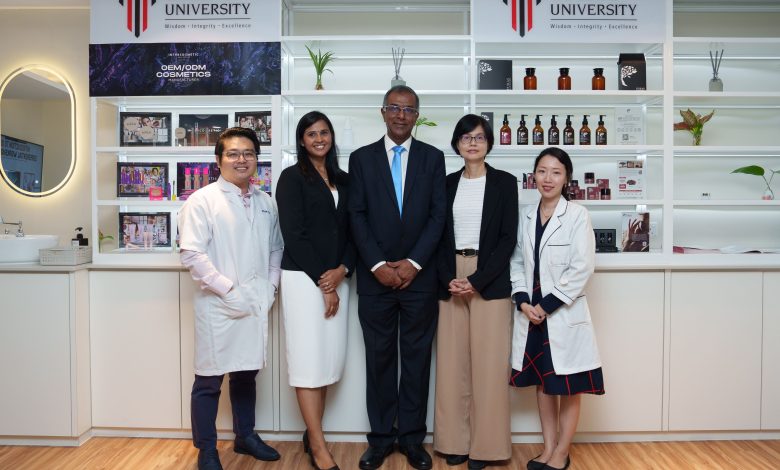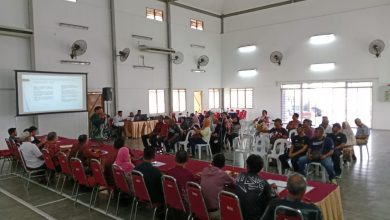

Recognising the importance and the growth potential of the pharmaceutical sector, Taylor’s University announces the launch of the Bachelor of Pharmaceutical Science (Honours).
Comprising a relevant blend of academic rigour and a practical and holistic experience, this programme is poised to shape students to become the future-ready workforce in demand by the pharmaceutical sector.
Offered under the School of Pharmacy at Taylor’s University, the new Pharmaceutical Science undergraduate programme is the first of its kind in Malaysia to offer the Work-Based Learning (WBL) mode and complementary studies in Cosmetic Science for its students. Students choosing the WBL option will put their knowledge into practice in real-world work settings during their final year, thus giving them a competitive edge and an accelerated entry into the job market.
The Cosmetic Science extension of this new programme meanwhile will see students develop a deep understanding of the science and technology behind cosmetics, gaining insight into global cosmetic markets and regulations, and learning how to ensure sustainable, eco-friendly, ethical and halal practices are upheld in the industry.
“With a focus on flexibility and industry relevance, students can choose between the conventional three-year programme or WBL modes, tailoring their learning experience to their career aspirations. Further enhancing their competitive edge are the complementary study options such as Drug Discovery & Development and Cosmetic Science, which are supported with our brand new state-of-the-art Cosmetic and Perfumery Laboratory located on campus,” said Dr Wong Jia Woei, Programme Director of the Bachelor of Pharmaceutical Science (Honours).
The programme offers students the opportunity to engage with industry partners such as Kotra Pharma, Sunward Pharmaceutical, KCK Pharmaceutical Industries, Pahang Pharmacy, Intercosmetic Asia Pacific, and Duopharma Biotech through Taylor’s innovative Work-Based Learning experience. Students who choose the conventional path will also benefit from the Pharmaceutical Industry Student Adoption (PISA) programme and are offered internship placements with more than 10 leading companies including multinational pharmaceutical organisations such as Abbott, AstraZeneca, Johnson & Johnson, and Pfizer.
The curriculum also recognises that the pharmaceutical industry is interconnected with various business aspects, and equipping students with a well-rounded understanding of both scientific and business principles is essential. This also opens doors to a variety of career options and opportunities beyond just the traditional laboratory or research roles.
Dr Wong added that the all-inclusive programme will see graduates develop a comprehensive understanding of pharmaceuticals, drug design and development, manufacturing, compliance, and regulatory practice, and even business, positioning them as highly sought-after professionals in the rapidly expanding pharmaceutical market.
Professor Dr P.T. Thomas, Executive Dean of Taylor’s Faculty of Health and Medical Sciences, applauded the school’s initiative in introducing this innovative new programme that meets industry demands.
“Currently, most of Malaysia’s pharmaceuticals and cosmetics are imported and it is therefore crucial that we expand the capabilities of our local manufacturers and industries to gain a greater share of this market sector. This is not just in the business sense but also in terms of being less dependent on other countries. Our Bachelor of Pharmaceutical Science (Honours) programme steps in to represent a significant milestone in Malaysia’s pharmaceutical education landscape. By combining academic excellence and world-class facilities with industry immersion, we are shaping future leaders who will drive innovation in the pharmaceutical and healthcare sectors.”
The pharmaceutical sector in Malaysia is experiencing exponential growth at an annual rate of 6.34 percent, with market revenue projected to reach USD 1.6 billion in 2024, and exports of pharmaceutical products worth USD 468 million in 2023.
Recognising this immense potential, Malaysia’s New Industrial Master Plan 2030 headed by the Ministry of Investment, Trade and Industry also identifies key growth segments in areas such as biologics such as insulin and vaccines, active pharmaceutical ingredients (API), manufacturing of niche botanicals, and halal medicines aiming to integrate the value chain to improve the nation’s production capabilities.
Taylor’s University’s Bachelor of Pharmaceutical Science (Honours) opens its first intake of students in April 2024, and has two annual intakes for the April and September semesters.
For more information about the programme, visit bit.ly/TaylorsPharmSci


